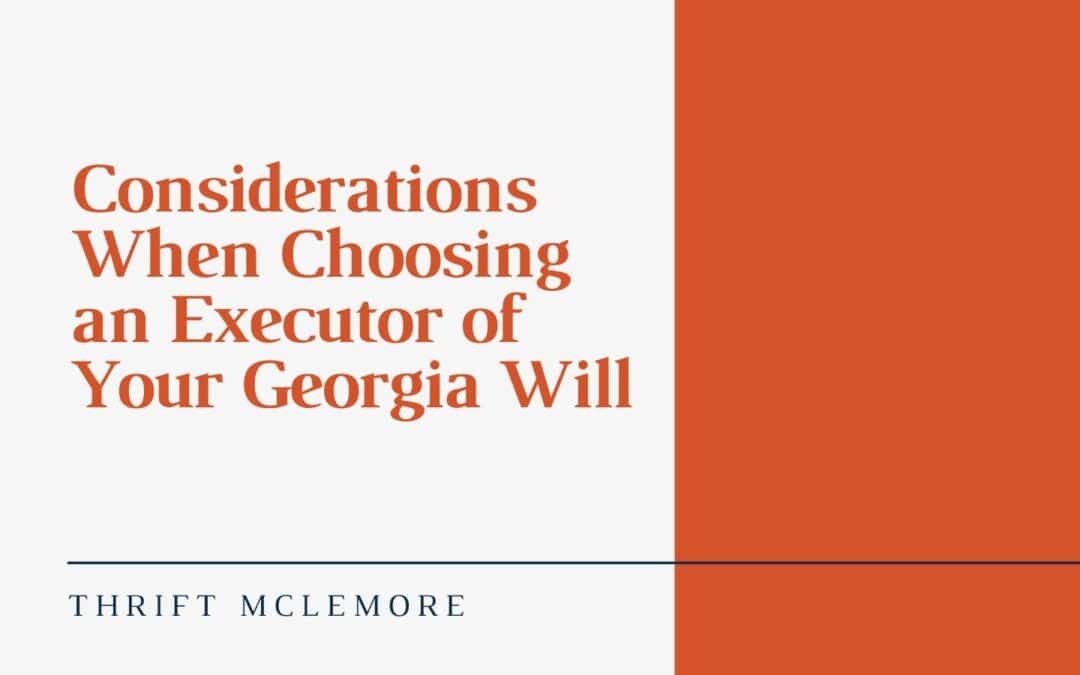Choosing the right person to serve as the executor of your Last Will and Testament is crucial to ensure that your wishes are carried out smoothly and efficiently.
What an Executor’s Role Involves in Georgia
The executor’s job is to ensure your debts and taxes are paid and that the remaining assets are distributed according to the terms of your Will. To do this, the executor typically must go through the court-supervised probate process to wrap up a person’s affairs after they pass away.
In addition to these administrative duties, your executor may be asked to mediate disputes among your beneficiaries. In short, being an executor involves a great deal of responsibility!
Why Choosing the Right Executor Matters
Selecting the wrong person can lead to a number of issues. These include tax problems, mismanagement of funds, unnecessary delays, and conflict amongst your loved ones.
Factors to Consider When Naming an Executor
When choosing the right person to be your executor, here are some things to consider:
1. Know Georgia’s legal requirements
State law dictates who may serve as an executor. In Georgia, you can name anyone as your executor so long as the person is over the age of 18 and of sound mind.
Unlike some states, Georgia law does not require that the executor live in-state. However, your executor will likely find it easier to fulfill their probate court duties if they live locally.
2. Prioritize the right qualities
While a financial or legal background certainly helps, neither is a prerequisite for success. Your executor can always hire help when needed. For example, they can hire an accountant to assist with tax returns or an attorney to guide them through the probate court process.
It is far more important to name someone you trust who is good at getting things done and communicates well. Probate can be a long process, even when there are no issues. Beneficiaries can often grow impatient, especially if they don’t know what’s going on with the estate. For this reason, communication skills are imperative for an executor.
3. Consider professional or corporate executors
People often select a family member or close friend as their executor. If you don’t have a friend or family member you feel comfortable naming, another option is to select a financial institution, such as a bank or trust company.
A financial institution is a neutral third-party with no conflicts of interest. The downside of this option is that they almost always charge a fee for their services. If you decide to name a financial institution or professional as your executor, make sure you understand their fee structure.
4. Use caution when naming co-executors
Typically, when someone wants to name more than one person as their executor, it is because they either want to spare someone’s feelings or assume it will make the job easier by naming multiple people.
But rarely does it make sense to name more than one person as your executor. Even if they get along, that does not necessarily mean they will work well as co-executors. Furthermore, some tasks require all of the co-executors to act together. This can make things more complicated, especially if the executors do not live near each other.
5. Name a backup
While your first-choice executor may agree to fulfill the duties of the role, his or her circumstances may be completely different when the time comes. For this reason, we encourage our clients to name at least one alternate.
6. Review your estate plan regularly
What works perfectly today may not work years from now. This is why it’s essential to review your estate plan periodically to ensure it accurately reflects your current wishes.
How Proper Planning Protects Your Loved Ones and Your Wishes
Given the importance of choosing the right person for the role of executor, it is imperative to have an estate plan so that the choice is yours. Without a Will, a judge will choose someone for you.
Speak With an Atlanta Estate Planning Attorney
Choosing an executor is just one part of building a comprehensive estate plan. At Thrift McLemore, our Atlanta estate planning attorneys help families across Georgia protect what matters most and avoid unnecessary complications and expenses.
For more information or to discuss the estate planning options, call our office at 678-882-0830 to speak with an experienced Georgia estate planning attorney.







